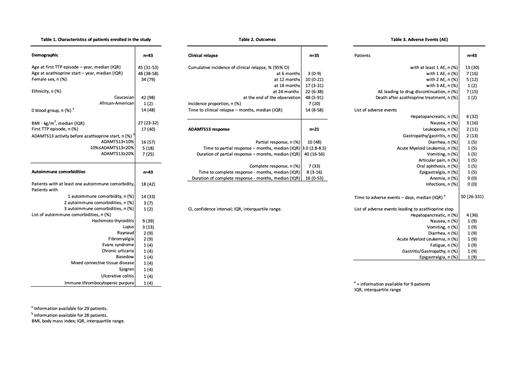Abstract

Introduction
Acquired immune-mediated thrombotic thrombocytopenic purpura (iTTP) is a rare and life-threatening thrombotic microangiopathy caused by the development of anti-ADAMTS13 autoantibodies. Up to 50% of patients surviving an acute iTTP event experience one or more relapses. Recent guidelines suggest treatment with rituximab in clinical remission in iTTP patients with low ADAMTS13 activity to prevent acute iTTP relapses. A 10% of cases who do not respond to rituximab or develop allergic reactions requiring therapy discontinuation have been reported. In these patients, azathioprine might be an alternative treatment to prevent acute iTTP relapses. The aim of this study was to assess the efficacy and safety of azathioprine treatment in iTTP patients in clinical remission.
Methods
We designed a retrospective cohort study including all iTTP patients treated with azathioprine during clinical remission, enrolled in the Milan TTP Registry between May 2003 and October 2020 and followed for at least six months.
The efficacy of azathioprine was assessed in patients with at least four weeks of treatment. The primary outcome was clinical relapse during azathioprine treatment. The secondary outcomes were the partial and complete responses of ADAMTS13 (an ADAMTS13 activity increase above 20% and 45%, respectively) in patients with ADAMTS13 activity below 20% before azathioprine start. ADAMTS13 relapse (an ADAMTS13 activity decrease below 20%) in patients with a prior ADAMTS13 response was also assessed.
As for the safety analysis, adverse events (AEs), associated or not with treatment discontinuation, were retrieved from clinical charts of all patients.
Lastly, we assessed the association between variables such as sex, age, and concomitant autoimmune diseases, and ADAMTS13 response, using logistic regression models.
Results
We enrolled 43 patients with iTTP treated with azathioprine during clinical remission (Table 1). Forty-two percent of the patients had at least one concomitant autoimmune disease. The median exposure to azathioprine was 16 months (interquartile range [IQR] 8-49 months), the median dosage 1.3 mg/kg/day (IQR 0.9-1.6 mg/kg/day).
Thirty-five cases were available for the primary outcome analysis (Table 2). Seven patients relapsed after a median time of 14 months after azathioprine start (IQR 8-58 months). The cumulative incidence of clinical relapse during azathioprine treatment was 10% at 1 year (95% Confidence Interval [CI] 0-21%), 22% at 2 years (95% CI 6-38%).
Twenty-one cases were available for the secondary outcomes analysis. An ADAMTS13 partial response occurred in 10 patients (48%), after a median time of 3 months (IQR 3-9 months) after azathioprine start and lasted for a median time of 40 months (IQR 16-56 months). An ADAMTS13 complete response was achieved in 33% of patients, after a median time of 8 months (IQR 3-16 months) after azathioprine start and lasted for a median time of 16 months (IQR 0-53 months). Of the 10 responders, 3 (30%) had a subsequent ADAMTS13 relapse at 22, 24 and 37 months after azathioprine start.
Adverse events were observed in 30% of patients, after a median time of 50 days after azathioprine start (IQR 26-331 days). Liver and pancreas alterations with increased levels of ALT, AST, GGT, ALP and lipase were the most frequent, followed by nausea and leukopenia (Table 3). In one patient, acute myeloid leukemia was diagnosed 6 months after azathioprine start. Fifteen percent of the patients had to stop the treatment due to AEs.
No demographic or anamnestic variables were associated with ADAMTS13 response to azathioprine.
Conclusions
Forty-eight percent of patients attained an ADAMTS13 activity above 20%, with a durable response lasting more than 3 years, while adverse events were generally mild in nature. Azathioprine could be a valid and safe alternative in case of ineligibility or failure to respond to rituximab.
Mancini: Instrumentation Laboratory, Sanofi: Honoraria. Peyvandi: Roche: Consultancy, Honoraria; Takeda: Consultancy, Honoraria; Sanofi: Consultancy, Honoraria; Sobi: Consultancy, Honoraria.
Azathioprine. It is an immunosuppressive drug used for the prevention of rejection in renal homotransplantation and for treatment of active rheumatoid arthritis.
Author notes
 This icon denotes a clinically relevant abstract
This icon denotes a clinically relevant abstract


This feature is available to Subscribers Only
Sign In or Create an Account Close Modal